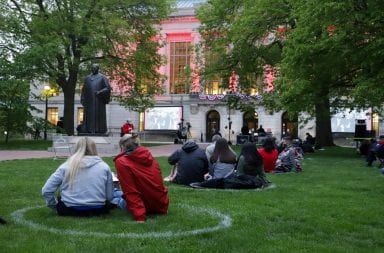Internet hacking savants under the name “Anonymous (Anon)” disabled multiple government and corporate websites including the Department of Justice, the FBI, Universal Music and more Thursday in retaliation to the FBI shutting down MegaUpload.com, a file sharing website accused of hosting pirated materials.
“We Anonymous are launching our largest attack ever on government and music industry sites. Lulz,” Anonymous said in an online statement. “The FBI didn’t think they would get away with this did they? They should have expected us.”
The Department of Justice filed a 72-page indictment against MegaUpload and it was taken down amidst the media-storm surrounding SOPA, a bill proposed that would allow the government to block access to sites of its choosing.
The bill was not in effect Thursday but MegaUpload was still taken down by the Department of Justice and the FBI, stating the site and its owners had been “running an international organized criminal enterprise allegedly responsible for massive worldwide online piracy of numerous types of copyrighted works … generating more than $175 million in criminal proceeds and causing more than half a billion dollars in harm to copyright owners.”
Anon’s twitter feed, @YourAnonNews, was ablaze Friday when it was announced that both SOPA and PIPA bills have been pulled for revision, saying, “THIS IS VICTORY! SOPA is DEAD!” The congress members sponsoring the bill have not publicly listed Anon’s actions as a reason for reconsideration.
Along with the list of sites Anon attacked, they also list information about Motion Picture Association of America CEO and former Sen. Christopher Dodd, Jr. (D-Conn.), his family, addresses and personal contact information. The MPAA defines what material can be considered pirated, and its site was one of those attacked in the retaliation.
Anon has claimed responsibility for a multitude of digital retaliations and campaigns including attacks on PayPal and the Church of Scientology, claiming that acts of censorship had occurred and thus warranted their brand of punishment some media outlets refer to as “hacktivism.”
Anon has been said to use a hacking method known as a denial-of-service attack, which in some cases involves making a site unusable by overwhelming its server with impossible requests.
“We are Anonymous. We are Legion. We do not forgive. We do not forget. Expect us,” Anonymous has said in multiple statements.
As for Ohio State, online security has been beefed up since the server breach in 2010, which might have leaked identity information to about 760,000 students, staff and other affiliates. Details on the breach and security improvements are restricted, as “Ohio law protects security and infrastructure of computer systems from disclosure,” said university spokesman Jim Lynch.
“We have to be right all the time and hackers only need to be right once. In our two most recent incidents, we had no evidence that any sensitive data was taken from the systems,” Lynch said in an email. “But, as a result, we are constantly examining our policies and procedures. We continually work to enhance our systems and practices.”
And piracy is not taken lightly when using university resources.
The Student Life Technology Services network monitoring system is able to detect, down to the name of the file in question, when file sharing software is being used. Anyone attempting piracy in this manner is sent an email “in order to comply with Federal Copyright Law and university policy,” notifying them their network services could be terminated upon further infraction, according to university policy.
According to the “Responsible Use of University Computing and Network Resources” policy from May 10, 2000, on the OSU website, violations will result in an investigation and any penalties will be imposed by the Office of Student Judicial Affairs. But the university may block users from access to an account “prior to the initiation or completion of such procedures” if the university finds it necessary to do so.
“We are constantly re-examining our policies and procedures to identify and correct any weaknesses,” Lynch said.
In an earlier version of this story, The Lantern spelled the name of the Internet hacking group as “Anonynous.” The correct spelling is “Anonymous.”


